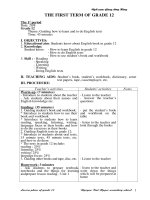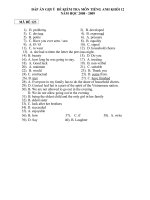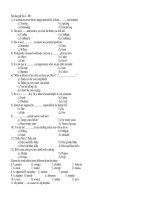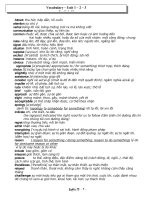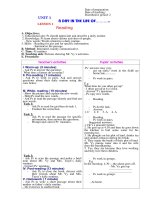Unit 1 (2) THE ECONOMIC PROBLEM
Bạn đang xem bản rút gọn của tài liệu. Xem và tải ngay bản đầy đủ của tài liệu tại đây (978.88 KB, 25 trang )
UNIT 1
THE ECONOMIC PROBLEM
PRE-READING
1. What’s the difference between need and want?
- Needs are the basic necessities for a person to survive —food, clothing and shelter.
- Wants are something you wish to have. Wants are useful, but not necessary for
survival.
2. Are people’s wants limited or unlimited?
- unlimited/ not satisfied
SCARCITY
(Unlimited wants and limited resources)
3. What is the difference between shortage and scarcity?
Shortage
- Temporary condition
Scarcity
- Permanent condition
- Demand > Supply
- There are limited resources to
(Caused by increase in demand or
meet unlimited wants and needs.
decrease in supply)
Click icon to add picture
ECONOMIC PROBLEM
•
Economic problem
•
Limited resources
•
Choice and opportunity cost
•
Samuelson’s three questions
EXERCISE 1
1. What is the economic problem? Why does it exist?
2. How are resources limited?
Resources are limited in two essential ways:
Limited in physical quantity, as in the case of
land, which has a finite quantity.
Limited in use, as in the case of labour and
machinery, which can only be used for one purpose
at any one time.
3. Why do all economic decisions involve making choices?
-
Because resources are limited.
4. What is the opportunity cost?
- The opportunity cost is the loss of the next best option/ alternative which represents the
real sacrifice when making an economic choice.
5. What questions must be answered for an economy to work well?
5. Which of the following statements is correct?
A.
Only poor people have the problem of scarcity
B.
Opportunity cost is the value of all the alternatives that have not been chosen.
C.
the next best alternative
We can apply the concept of opportunity cost to time.
D.
Supply refers to people’s needs for goods and services.
Demand
EXERCISE 2
Find the synonyms of the following words in the reading passage
1.
Unlimited
2. Finite
3. Basic
4. Choice
5. Try
6. Recognize
7.
Satisfy
8. Allocation
Endless
Limited
Fundamental
Option, alternative
Endeavour
Appreciate
Meet
Distribution
EXERCISE 3
1.Economics
…………………………….
is the social science that studies how people use scarce
resources to satisfy/meet unlimited needs and wants.
scarcity
2.The basic economic problem is …………………………….
which is the idea that human
beings want more things than what is available to them.
3.Resources
……………………………. such as labor, tools, land, and raw materials are necessary to
produce the goods and services we want but they exist in limited supply.
4.There is limitation in resources, so people are
unable to attain/ obtain everything
they desire. This forces humans to …………………………….
5.Since we have limited resources, we usually have to choose one option/ alternative
make choices
and forgo the other. This phenomenon is called …………………………
opportunity cost
6.Scarcity, choice and opportunity cost are three basic/ fundamental ……………………………..
in economics.
concepts
7.Once what to produce has been decided, the next question that must be addressed is
……………………………..
8.Every economy has to make decisions
in regard to what, how and
how to produce
……………………………..
9.The function of the economy is to …………… scarce resources among unlimited
wants.
for whom to produce
10.Economists study the production, ........................................, and consumption of
goods and services.
allocate
distribution
EXERCISE 4
› Talk to your partner/ class about your recent opportunity cost
EXERCISE 5
1.
Do you agree that the scarcer a good is, the more we want it? Why/Why not?
2.
When is a good not considered scarce?
- A good is not considered scarce if the unlimited wants and needs of that good can be met by
resources.
3.
Is there anything that you can use it free (something that you have infinite access to and you
would never expect to run out)?
- It is air. Air is not scarce. It is a good that everyone has unlimited access to, and no one has to pay to
consume it.
EXERCISE 6
Watch the video and use the information in the video to answer the following questions.
1.
Is economics all about making money?
2.
What are the two causes of scarcity?
3.
Why do we have to make a choice?
4.
When is an opportunity cost involved?
5.
What may be the opportunity cost of attending college instead of getting a job?
6.
Why do NBA players often choose not to attend college?
7.
What is the choice that married women have to make?
Exercise 6
Watch the video and use the information in the video to answer the following questions.
1.
Is economics all about making money?
NO
2.
What are the two causes of scarcity?
Unlimited wants and limited resources
3.
Why do we have to make a choice?
We have to make a choice because we cannot satisfy all our wants due to scarcity.
4.
When is an opportunity cost involved?
An opportunity cost is involved when you make a choice
Exercise 6
Watch the video and use the information in the video to answer the following questions.
5.
What may be the opportunity cost of attending college instead of getting a job?
The job experience you sacrifice.
6.
Why do NBA players often choose not to attend college?
Because the opportunity cost of attending college instead of playing in the NBA is million dollars.
7.
What is the choice that married women have to make?
Married women have to make a choice between having children and maintaining a career
Exercise 7
Identify the opportunity cost in each of the following situations.
For example:
You only have two hours of free time. You could either go to a movie or visit the bookstore.
If you choose to spend your time at the movie, the opportunity cost of this decision is the
time you could have spent enjoying the bookstore.
EXERCISE 7
1. Susan bought a movie ticket, but then she decided to give up going to see the movie to
study for her exam in order to get on good grade.
The opportunity cost was the cost of the movie and the enjoyment of seeing it.
2. At the ice-cream parlor, you considered choosing between chocolate and coconut and you
chose coconut ice-cream.
The opportunity cost was the enjoyment of the chocolate ice-cream
3. My brother wants to attend volleyball training to be a better player instead of taking a
summer vacation.
The opportunity cost is the vacation.
4. Roger gets a good pay but he has decided to quit working next month to further his study.
The opportunity cost of this decision is the lost salary.
5. As an attorney, Mr. Green makes $500 an hour. His house needs painting. If he hires a
professional painter, he will have to pay the painter $1,200. However, he is considering painting
his house himself although will take five hours.
His opportunity cost of doing it himself is $1,300.
6. We are using farmland to grow corn, but we want to use part of the farmland to raise cattle.
The opportunity cost is the amount by which the production of corn decreases.
7. You spend $8 on lunch every day at work although you may know perfectly well that bringing
a lunch from home would cost only $4 a day.
The opportunity cost of buying lunch at the restaurant is $4 each day.
8. Mr. Cameroon owns 200 acres of farmland. He can either farm the land or rent it to a neighbor.
The cash rental rate is $120 per acre, but he wants to farm the land.
The opportunity cost of farming the land and not renting it to the neighbor is
$24,000 ($120 X 200 acres). So, unless Mr. Cameroon can generate net returns of
more than $24,000 from farming the land, he is financially better off renting the land
to the neighbor.


